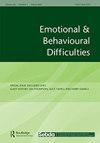Disrupting unlawful exclusion from school of minoritised children and young people racialized as Black: using Critical Race Theory composite counter-storytelling
IF 1.5
Q3 PSYCHOLOGY, EDUCATIONAL
引用次数: 0
Abstract
ABSTRACT Utilising Critical Race Theory (CRT) as the analytical lens and CRT composite counter-storytelling as the method, this paper seeks to illuminate the experiences of minoritised children and young people racialised as Black in relation to encounters with the exclusionary practice called ‘off-rolling’. We conceptualise off-rolling as a hidden process of exclusion in education, and the stories shared in this paper bring into sharp focus the educational, relational and emotional impacts of camouflaged exclusionary practices. We offer four composite stories of exclusion to demonstrate how some of the most vulnerable, excluded, and marginalised young Black people from English urban cities experience further marginalisation because off-rolling, we argue, places learners in a space (both physically and educationally) located beyond care and inclusion. Storytelling is mobilised as a central method in CRT for challenging and exposing exclusionary practices, as it foregrounds the knowledge and lived experience of people of colour and we explore the processes of constructing such counter-stories. As an encouragement to reflection and critical conversation about unlawful exclusion and racial disparities, this paper was written with three goals in mind. The first is that it may inspire educators of colour to tell counter-stories that name their own reality and experiences of exclusion. Second, that in reading and responding to counter-stories, white educators will be encouraged to develop their own racial literacy. Finally, the third goal is that the call to action is answered from within and beyond the confines of academia, where inclusion and racial justice in education can no longer be left to wait.打破学校对少数族裔儿童和黑人化年轻人的非法排斥:运用批判种族理论复合反叙事
本文以批判种族理论(CRT)为分析视角,以CRT复合反叙事为方法,试图阐明被种族化为黑人的少数民族儿童和年轻人在遭遇被称为“滚落”的排斥性做法时的经历。我们将滚子概念化为教育中隐藏的排斥过程,本文中分享的故事将伪装的排斥实践对教育,关系和情感的影响带入了尖锐的焦点。我们提供了四个关于排斥的综合故事,以展示英国城市中一些最脆弱、被排斥和被边缘化的年轻黑人如何经历进一步的边缘化,因为我们认为,滚落教育将学习者置于一个超越关怀和包容的空间(无论是身体上还是教育上)。在CRT中,讲故事是一种挑战和揭露排斥性做法的核心方法,因为它突出了有色人种的知识和生活经验,我们探索了构建这种反故事的过程。为了鼓励对非法排斥和种族差异进行反思和批判性对话,本文的写作目标有三个。首先,它可能会激励有色人种教育者讲述他们自己的现实和被排斥经历的反故事。其次,在阅读和回应反故事的过程中,白人教育者将被鼓励发展自己的种族素养。最后,第三个目标是在学术界内外响应行动呼吁,教育中的包容和种族正义不能再等待。
本文章由计算机程序翻译,如有差异,请以英文原文为准。
求助全文
约1分钟内获得全文
求助全文
来源期刊

EMOTIONAL AND BEHAVIOURAL DIFFICULTIES
PSYCHOLOGY, EDUCATIONAL-
CiteScore
1.80
自引率
10.00%
发文量
10
期刊介绍:
The central intention of Emotional & Behavioural Difficulties (EBDs) is to contribute to readers" understanding of social, emotional and behavioural difficulties, and also their knowledge of appropriate ways of preventing and responding to EBDs, in terms of intervention and policy. The journal aims to cater for a wide audience, in response to the diverse nature of the professionals who work with and for children with EBDs.
 求助内容:
求助内容: 应助结果提醒方式:
应助结果提醒方式:


